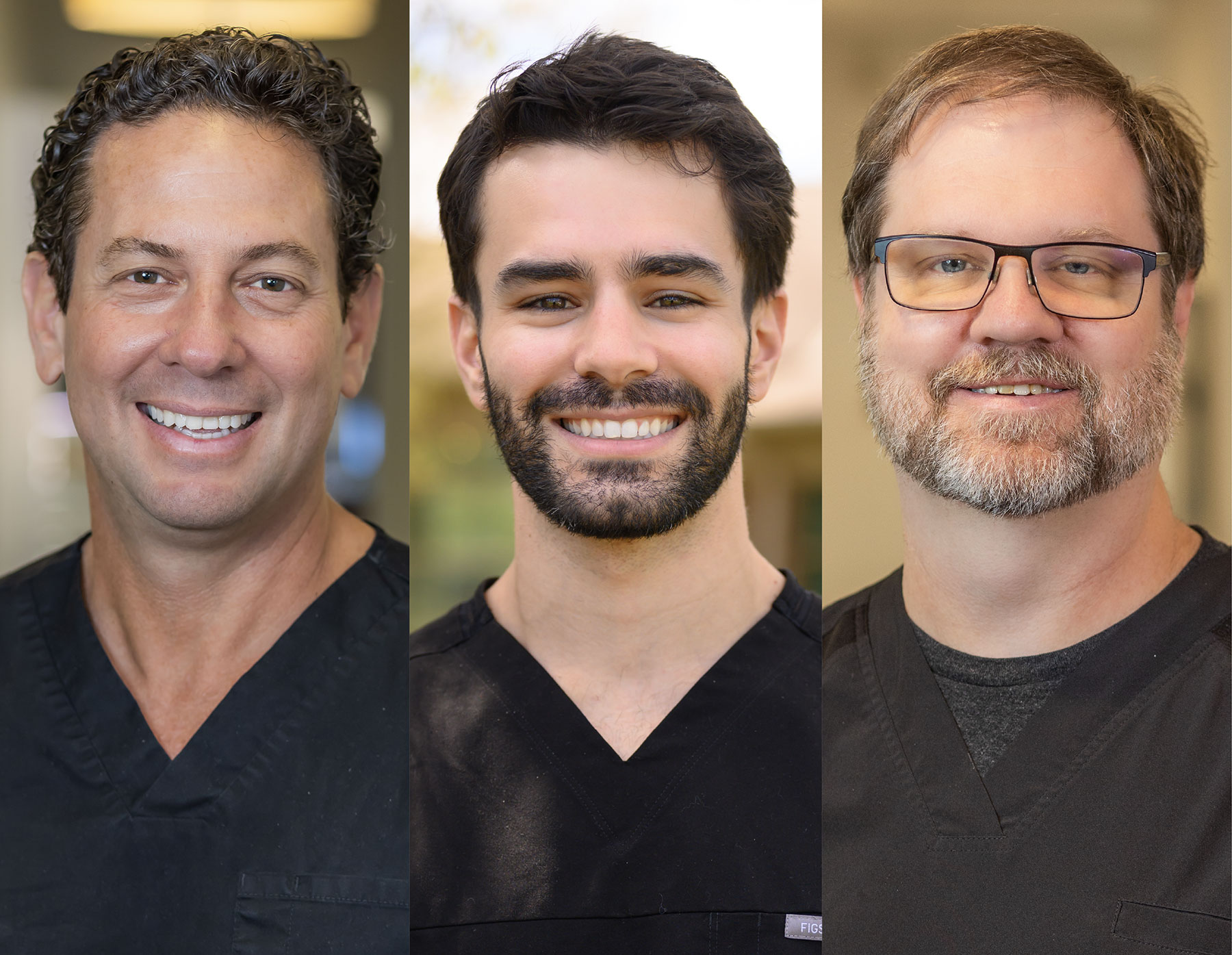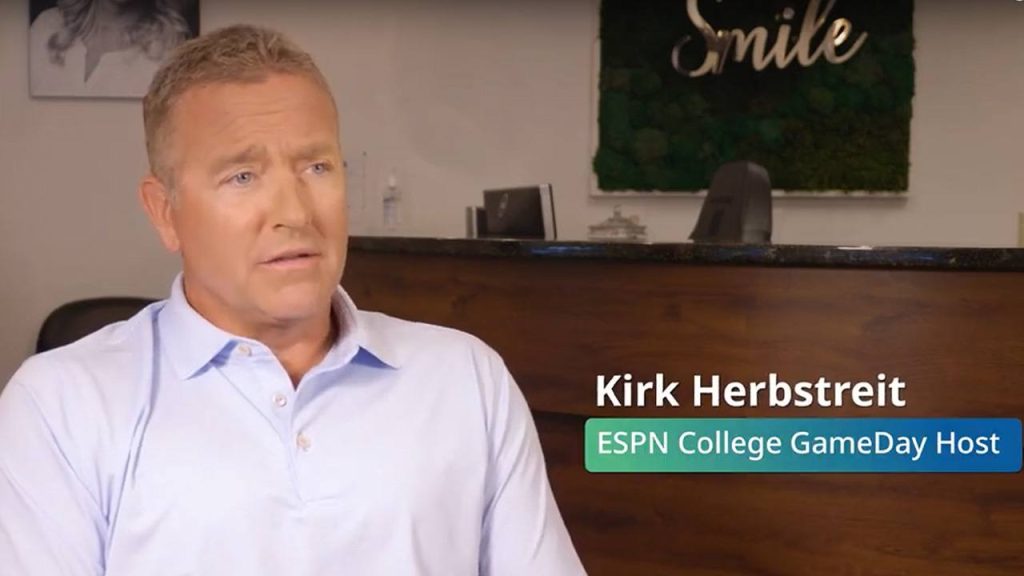emergency Dentist – Upper Arlington, OH
Put a Stop to
Your Pain – Fast
Dental emergencies can be scary, but it’s good to know that you have a team of trustworthy dental experts that you can turn to should the worst happen. Contact Tzagournis Dental Group of Upper Arlington immediately if you need emergency dental care. We can schedule a same-day appointment for you so that you can get the relief you need as soon as possible. We’ll work quickly to put a stop to your pain and reverse the damage done to your smile.
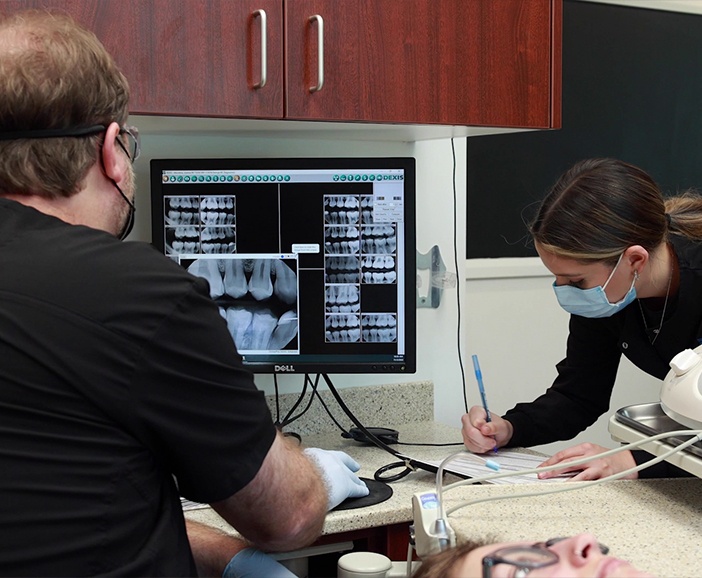
Why Choose Tzagournis Dental Group of Upper Arlington for Emergency Dentistry?
- Same-Day Emergency Dental Care Available
- Multiple Forms of Sedation to Soothe Nerves
- Highly Experienced Dentists & Team
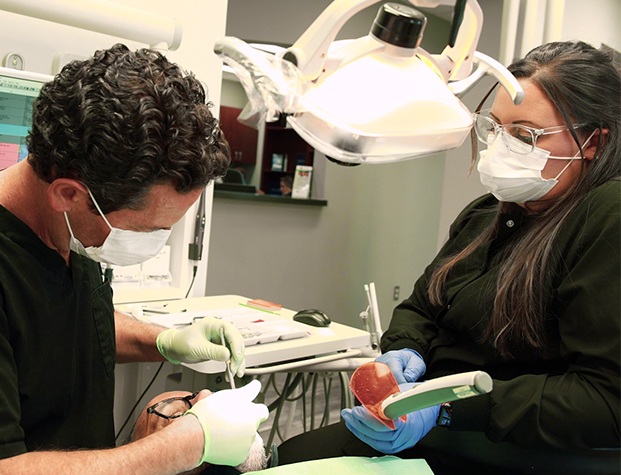
How We Treat Dental Emergencies
The Most Common Dental Emergencies
“Dental emergency” can refer to many different situations. If you’re not sure that your particular problem counts as an emergency, give us a call; we’ll listen as you describe your symptoms and help you determine whether you truly need urgent care. Below are some of the most common dental emergencies that our practice can help you with.
Toothaches
Toothaces
Is My Toothache a Dental Emergency? When patients imagine dental emergencies, their minds often go to extremes. However, even something as “minor” as a toothache may require same-day treatment, especially if the pain has persisted for more than 24 hours.
How You Should Handle a Toothache It can be helpful to call our Upper Arlington dental team first. That way, we can learn more about your symptoms and determine if you need to come in right away. Even if you don’t, we can walk you through what to do from home, like rinsing with warm saltwater and sticking to soft foods that aren’t acidic, spicy, or sugary.
How We Treat Toothaches Since toothaches could be the result of anything from a small cavity to a large crack, we need to thoroughly examine your tooth first. Then, we can determine if a tooth-colored filling, dental crown, or root canal treatment is needed.
Chipped Tooth
Chipped Tooth
Is a Chipped Tooth a Dental Emergency? Sometimes! There are two factors that need to be considered: the size of the tooth and if you’re in pain. If you are ever uncertain, you can always give us a call – we’ll help you determine what the next best steps are.
How You Should Handle a Chipped Tooth Since chipped teeth can break further, we recommend placing some dental wax or sugar-free gum over the tooth. In addition to preventing sensitivity, this will help protect the tooth from breaking until we have a chance to administer the necessary treatment.
How We Treat Chipped Teeth Direct bonding and veneers are both treatments that can restore the look and function of a chipped tooth! The one we recommend for you will depend largely on the size of the chip as well as the location of the tooth.
Cracked Tooth
Cracked Tooth
Is a Cracked Tooth a Dental Emergency? Yes! Not only can a cracked tooth result in immense pain, but it can also easily develop an infection or break further. So, don’t wait – call our Upper Arlington dental team ASAP so we can schedule your treatment.
How You Should Handle a Cracked Tooth Mainly, your focus should be protecting your tooth from additional damage. To do so, avoid eating anything on that side of your mouth and periodically rinse with clean water. Taking an OTC pain reliever as directed can also help if you’re dealing with significant discomfort.
How We Treat Cracked Teeth We have a few options. If saving your tooth is feasible, then we can use a dental crown. If it’s not, then we need to carefully extract it before putting a dental bridge or implant in its place.
Sensitve Tooth
Sensitive Tooth
Are Very Sensitive Teeth a Dental Emergency? If you experience some dental sensitivity while drinking a hot cup of coffee or eating a scoop of ice cream, you don’t need to schedule an emergency appointment. If, however, the discomfort persists for more than 24 hours or is present in tandem with other abnormal symptoms, like pain when biting down, then you should absolutely call our Upper Arlington dental team ASAP.
How You Should Handle Very Sensitive Teeth Until we can pinpoint the cause, the only thing you can do is try to avoid exacerbating your discomfort. This includes avoiding hot beverages, using a desensitizing toothpaste, and taking an OTC pain reliever as instructed.
How We Treat Very Sensitive Teeth Oftentimes, dental sensitivity is the result of enamel erosion or an untreated cavity. In that case, we will need to intervene with the necessary restorative care, like a tooth-colored filling or dental crown.
Kocked-Out Tooth
Knocked-Out Tooth
Is My Knocked-Out Tooth a Dental Emergency? Yes! It’s important that you call our Upper Arlington dental team right away and come in for treatment within the hour. Otherwise, there’s a higher chance that we won’t be able to save your tooth.
How You Should Handle a Knocked-Out Tooth If you are able to find your tooth, then pick it up gently by the crown (the chewing surface) and, if it’s dirty, rinse it off with clean water. After that, put it in a small container of milk or place it back in its socket. However, you should only do the latter if it slides into position easily.
How We Treat Knocked-Out Teeth First, we will see if saving your tooth is feasible. This is generally the case if your tooth is in good condition, and you make it to our office within 60 minutes. If it isn’t possible to save your tooth, don’t worry – we can restore the look and function of your smile with a state-of-the-art tooth-replacement solution, like a dental implant.
Lost Filing or Crown
Lost Filling or Crown
Is a Lost Filling or Crown a Dental Emergency? Definitely! After all, your treated tooth is now vulnerable to damage, like a serious chip or crack. Plus, this dental injury can result in significant sensitivity. For all of these reasons, we recommend coming in for treatment at our Upper Arlington dental office right away.
How You Should Handle a Lost Filling or Crown Handling a lost filling or crown is largely about protecting your tooth. To prevent an infection or further damage, we strongly recommend avoiding spicy, acidic, sugary, and crunchy foods. Additionally, you should use clean water to rinse your mouth frequently. If you have your restoration, then keep it in a small container for safekeeping.
How We Treat Lost Fillings or Crowns In both cases, we can provide you with a new restoration. If your dental crown came loose and you have it, however, then re-cementing it back in place may also be an option.
Broken Denture
Broken Denture
Is a broken denture a dental emergency? Absolutely! Ignoring a broken denture in Upper Arlington can lead to increased risks of damaging your natural teeth, gums, and jaw. Whether the break, chip, or crack occurs in any part of your prosthetic, it’s incredibly important to contact our office promptly and schedule an appointment with our team.
How to handle a broken denture: While you may consider a denture repair kit for emergency situations, it’s only recommended if you need to repair your teeth immediately. Otherwise, thoroughly inspect your denture before reaching out to us, as this assessment will help our team better understand the extent of the damage.
How we treat broken dentures: Upon visiting our dental office for treatment, our team will assess the damaged prosthetic. For minor cracks or chips, applying composite resin might be a cost-effective solution. However, if your dentures are extensively broken or damaged, replacement may be the only viable option. In such cases, you may explore dental implants as a more permanent solution.
Lost Filing or Crown
Permanent
Is a loose permanent tooth an emergency? Yes, it’s unusual for adults to have a loose permanent tooth. If you find yourself in that situation, be sure to seek professional assistance quickly as an extruded or partially dislodged permanent tooth requires immediate attention. Delaying treatment can lead to oral health complications and increased damage to soft tissues, bone, and neighboring teeth.
How you should handle a loose permanent tooth: If you have a loose tooth in Upper Arlington, refrain from touching it to prevent additional damage. Avoid chewing on that side of your mouth, especially with hard or sticky foods. Maintain good oral hygiene, but exercise caution while brushing and flossing around the partially dislodged tooth. Instead of rinsing, swish water around in your mouth to clean without causing harm to your smile.
How we treat loose permanent teeth: Our team is dedicated to addressing your loose permanent tooth promptly. If poor oral hygiene has led to periodontal disease, we’ll focus on treating the soft tissues to eliminate harmful bacteria. In cases of a deteriorating jawbone, a bone graft may be recommended to strengthen the area and support the tooth. If the tooth is no longer viable, extraction may be necessary. You can explore potential replacement options such as dental bridges or implants depending on your eligibility, budget, and preference.
Gums, Lips or Tongue Injury
Injury to the Gums, Lips, or Tongue
Is an injury to the gums, lips, or tongue a dental emergency? While these injuries shouldn’t be ignored, there’s no need to panic. A significant lip injury can lead to substantial bleeding which may seem alarming, but these types of injuries usually heal relatively quickly. Be sure to contact your emergency dentist in Upper Arlington right away when accidents affect your soft oral tissues to ensure no additional treatment is necessary.
How you should handle an injury to the gums, lips, or tongue: Following an injury, our emergency dentist may advise rinsing your mouth with warm water and applying gentle pressure to the affected area to reduce bleeding. Using a cold compress can also help minimize potential swelling and discomfort. If bleeding persists for more than 10 minutes, seek immediate medical assistance at your local emergency room.
How we treat injuries to the gums, lips, or tongue: Our team will assess the injury to determine whether stitches are necessary. Some cuts may be minor and do not require stitching. Additionally, we might suggest a customized mouthguard, especially if you participate in sports, as it can help prevent more severe dental injuries that may occur during games.
Jaw Pain
Jaw Pain
Is jaw pain a dental emergency? It depends on the underlying cause! Regardless of the reason, seeking prompt attention from our team is recommended for relief from discomfort. Jaw pain can extend beyond the immediate area, radiating to the back, shoulder, neck, and head, creating additional challenges in day-to-day functioning.
How you should handle jaw pain: If you have a broken or fractured jaw, seek help from a local emergency room if necessary. However, if TMD or bruxism affects your ability to open and close your mouth, eat, or speak, our practice can offer helpful homecare tips to alleviate discomfort while waiting for professional intervention.
How we treat jaw pain: Wy may recommend customized mouthguards to wear during sports activities or at night to mitigate bruxism. Other options include TMJ therapy or the extraction of wisdom teeth, which can contribute to jaw pain. Our team will conduct a thorough examination to create a personalized treatment plan that addresses your specific needs.
Something Stuck Between Teeth
Something Stuck Between the Teeth
If you have something stuck between your teeth, it’s advisable to use floss or a water irrigator for safe removal. Toothpicks, metal tools (such as forks or knives), or anything with a sharp edge can pose a risk to the rest of your mouth. A slip can result in cuts to your gums, lips, cheeks, or even cause a chip or crack in a tooth. Additionally, it may push the object deeper into the gums, making extraction more challenging.
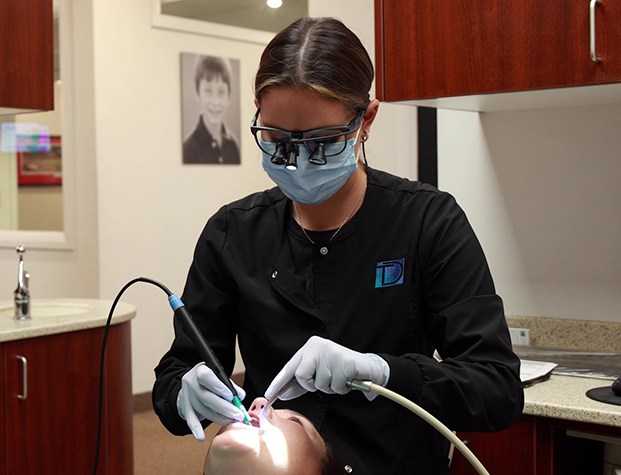
How to Prevent Dental Emergencies
It’s impossible to keep your smile completely safe from harm. However, there are some steps that you can take to reduce your chances of damaging your smile. Here are some helpful habits and tips so you can prevent dental emergencies.

Visit Your Dentist Regularly
Even if you don’t think there is anything serious going on with your smile, you should still be attending regular cleanings and checkups every six months. Tooth decay and oral infections can easily develop, and you might not even notice them right away. During your routine visits, your hygienist can clean away plaque and tartar, and your dentist can keep an eye out for issues so they can be treated early on.
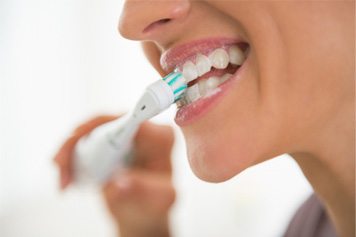
Maintain Good Oral Hygiene Habits at Home
You should brush your teeth twice and floss every day. These are both effective ways to remove food debris and plaque that can result in tooth decay and gum disease over time. Be sure that you choose a soft-bristled toothbrush and fluoridated toothpaste. Rinsing your mouth with mouthwash is also a great step to take.

Be Careful with Your Diet
Your diet plays a very important role when it comes to the health of your smile. If you are eating lots of sweet, sugary foods, you are increasing your risk of developing decay. Try to only consume sweets in moderation. Instead, you should enjoy plenty of fruits, veggies, and healthy proteins.
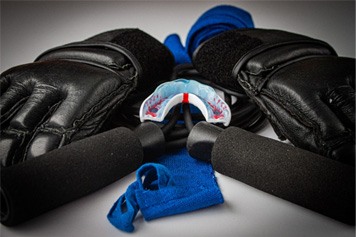
Wear a Mouthguard
Playing sports is a great way to get the exercise you need and have fun doing it! However, dental injuries are common during sports. By wearing a mouthguard, you can significantly reduce your chances of experiencing a dental injury.
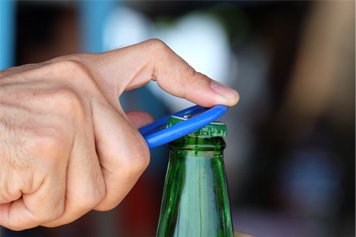
Use Tools, Not Teeth to Open Packaging
It may be convenient, but you shouldn’t use your teeth to open stubborn packaging, you could easily end up with a cracked or broken tooth. Instead, find scissors, a bottle opener, or another tool to help you safely complete your task.
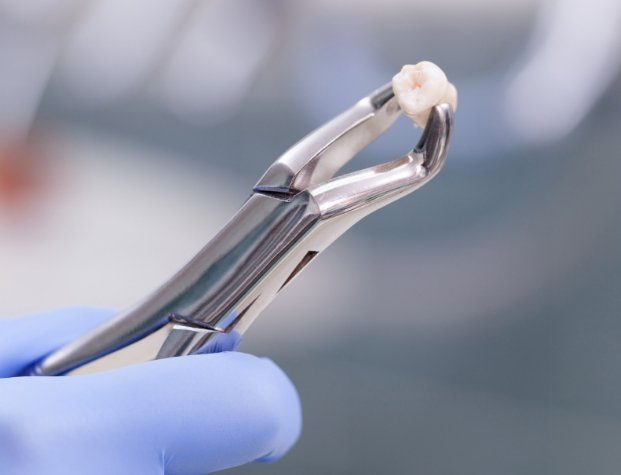
Tooth Extractions
Keeping all of your natural teeth is always the ideal choice, but there are cases where we might not have any option but to extract a tooth. This is usually only done for particularly severe situations where the tooth is beyond salvaging. Here are some of the most common reasons we might recommend a tooth extraction:
- Impacted: An impacted tooth has become trapped under the bone or gums and is unable to properly erupt.
- Crowding: Teeth that erupt too close together can throw off the alignment of the bite. They might also crack due to the limited space.
- Decay/Infection: If there’s extreme decay that can’t be fixed with a filling or an infection that can’t be treated with a root canal, extraction is often the only viable option.
We will always carefully consider all of the available treatment options and the state of your oral health before we suggest having a tooth extraction performed. During the tooth extraction process, we may recommend dental sedation to help you stay comfortable and calm.
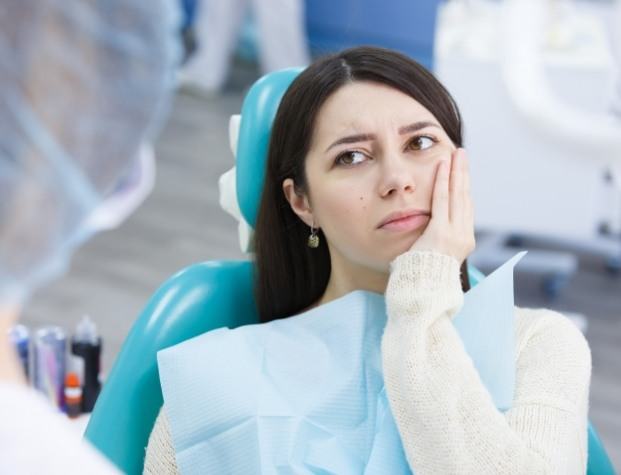
Wisdom Tooth Extractions
There is usually not enough room in the mouth for the wisdom teeth to erupt, which is why they typically need to be extracted before they cause any permanent damage or if they are already causing considerable oral pain. We can evaluate your wisdom teeth to see if they need to be removed; if they do, we will take whatever steps are necessary to keep you comfortable while we take out the teeth in question.

Understanding the Cost of Emergency Dentistry
There isn’t a flat fee for emergency dentistry. After all, patients visit our office for all sorts of reasons – from replacing a knocked-out tooth to treating a painful toothache. If you’re at all concerned about the cost, don’t worry – our Upper Arlington dental team will review all of your treatment options (and the cost associated with each) beforehand. In the meantime, you can learn more about the price of emergency dentistry right here!
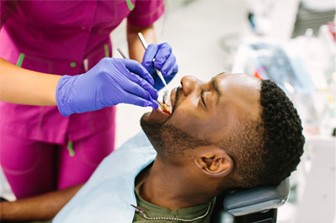
Every Dental Emergency is Different
Although every dental emergency is different, every appointment starts with the same step: thoroughly examining your mouth. Only then will our Upper Arlington dentists be able to determine the root of the problem, how severe it is, and what treatment is needed to restore your pain-free smile. Of course, there are other factors that will impact the price you pay out-of-pocket, including if you have any available dental insurance benefits.

Does Dental Insurance Cover Dental Emergencies?
Dental plans aren’t the same from patient to patient. As a result, the only way to know if your benefits cover a portion of the cost is to check! Our team would be more than happy to take a look at the fine print on your

